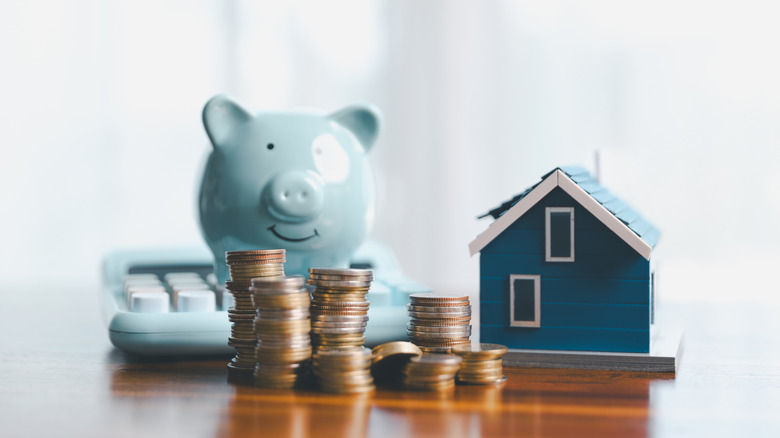The 'Magic' Savings Number You Need To Buy A House
Buying a home is one of the biggest financial goals for many people, but for some the process can feel complicated and out of reach. With rising prices and numerous fees associated with the buying process, it can be hard to even know how much money is truly needed to close on a home. That's why having clear savings goals benefits many. According to financial guidance group Ramsey Solutions, a good rule of thumb for potential home buyers is to save about 25% of their ideal home's sale price.
With that amount saved up, buyers can comfortably cover the down payments and closing costs. For example, on a $410,800 home — the median home price in 2025, according to the Federal Reserve Bank of St. Louis – a buyer would need around $102,700 saved up. However, that amount should be in addition to the amount of money one should have in an emergency fund, roughly six months' worth of living expenses. Having a separate emergency fund while on the house hunt provides an additional safety net in the event of unforeseen events like a job loss, incurred medical expenses, or even urgent home repairs. This can ultimately make navigating the homeownership process much more manageable.
Save 25% of the home's sale price, then consider other factors
Saving to cover the upfront costs of homeownership is only one part of the equation. Just as important is making sure you can comfortably afford the monthly payments once you move in. It's also recommended that buyers aim to keep mortgage payments (including principal, interest, taxes, and insurance) at under 25% of their take-home pay. This benchmark can protect buyers from overstretching their finances and becoming "house poor," a status in which most of their income goes toward housing, leaving very little for everyday expenses and savings.
Mortgage rates also play an important role in home affordability. Even a 1% difference in mortgage rate can cost or save hundreds of dollars on a monthly payment, often leading buyers to delay purchasing until a significant rate dip. However, experts say that the average homeowner's mortgage rate needs aren't likely to be seen anytime soon, with many expecting rates to hover around 6.5% through the end of the 2025. Despite the forecasts, buyers should be well positioned to act quickly in the event of a brief rate dip. Besides interest rates, perhaps the most important factor before buying a home is having reliable income and financial stability, a clear sign that buyers are ready to buy a house and can handle the long-term costs of homeownership.

